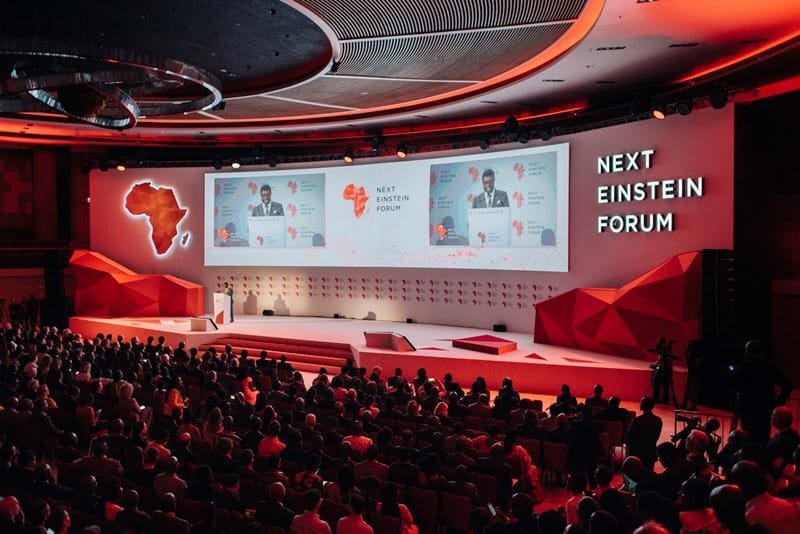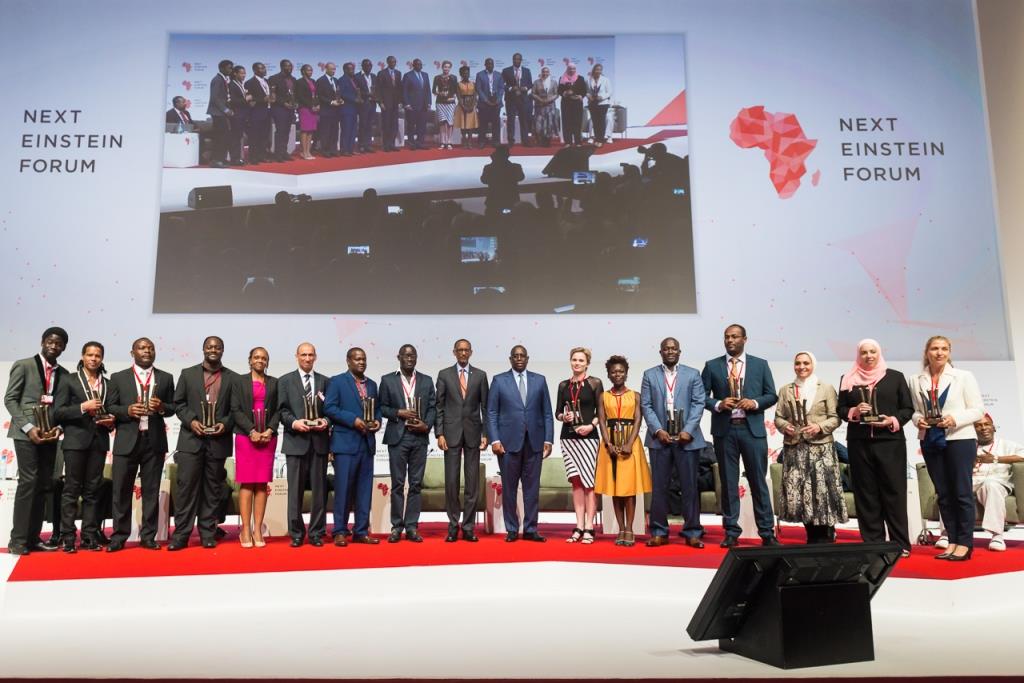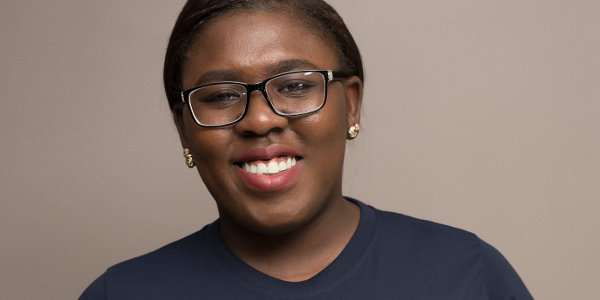Next Einstein Forum announces 2019-2021 class of NEF Fellows
The NEF Fellows program recognises Africa’s best young scientists and technologists. These innovators and emerging leaders, all under 42 years, at least 40 percent of whom are women, are chosen for their strong scientific record, the relevance of research or innovation, and potential for leadership. Meet the 2019-2021 class of NEF Fellows unveiled during the just concluded virtual edition of the NEF Global Gathering (NEF-GG) 2020. Selected from across Africa and the Diaspora, their areas of research range from medicine, cancer prevention, public health to urban life, environmental conservation, and sustainable development.

The Next Einstein Fellows for the 2019-2021 are Dr Vidushi Neergheen-Bhujun of Mauritius. Vidushi has taught undergraduate and postgraduate students in applied biochemistry for over 10 years. An associate professor since April 2019, she currently heads the Department of Health Sciences at the University of Mauritius and is affiliated with the institution’s Centre for Biomedical and Biomaterials Research at the Faculty of Science. Her research interest is centered on using functional food and medicinal plants indigenous to Mauritius to prevent several types of cancers in Africa.
Read also:Sub-Saharan Africa Sees App Downloads Grow by 55% in 2020
Dr Badre Abdselam of Morocco. Badre’s research focuses mainly on public policies of higher education and social economy addressing three social groups – women, migrants, and the youth – particularly in Africa. He is currently an associate professor of social sciences at Rabat-based Mohammed V University in Morocco and was NEF Ambassador for the country between 2016 and 2018.
Dr Ademola Adenle of Nigeria. Ademola has almost 20 years of combined experience in teaching and research at the international level, working at the interface of natural and social sciences. His research is interdisciplinary, focusing on sustainable development issues related to agricultural biotechnology, food security, climate change, health innovation, biodiversity conservation, renewable energy, and entrepreneurship. He has attracted a number of competitive grants for his research and has had his work featured in a number of local and international media outlets.
Read also:Why Are Investors Rushing After North Africa’s Fashion Startups?
Dr Fanelwa Ajayi of South Africa .Dr Ajayi in 2017 established two non-profit organisations where schoolchildren in marginalized communities can learn about science, technology, engineering, and mathematics (STEM) before tertiary education. AmaQawe ngeMfundo works on providing on-site STEM experiments for learners while KasiMaths, co-founded with four others, is a scalable low-cost mathematics HUB for learners. Both came after she won first prize at the prestigious TechWomen Programme in Silicon Valley. Dr Ajayi is currently a Senior Lecturer at the Chemistry Department of the University of the Western Cape (UWC) and a Research Lead at the Enzyme Sensor Laboratory, SensorLab, where she specializes in research that involves the development of drugs (particularly HIV and TB treatment).
Dr Daniel Akinyele of Nigeria. Daniel is one of the six grantees of the African Institute of Mathematical Science (AIMS) small grants in climate change science and is currently working on clean energy options for sustainable electricity supply to remote locations. A Senior Lecturer at the Department of Electrical, Electronics and Computer Engineering at Bells University of Technology in Ota, Nigeria, his expertise includes renewable energy, microgrid design, and planning, energy efficiency, life-cycle impact analysis, and sustainability.
Dr Zaheer Allam of Mauritius. Zaheer works towards accelerating the integration of technologies in urban life and cities, to better enhance governance and lead to informed decisions without compromising resilience. His approach has been widely featured in scientific publications and adopted at both policy and legislative levels. He also contributes to the work of numerous international organizations, driven by an interest in contributing to building a more humane world.
Read also:How Technology could Enhance PPP Projects
Dr Cecil Ouma of Kenya .A PhD holder in Physics, Cecil’s work centres on affordable and small-scale off-grid technologies for rural and peri-urban settlements in Africa. He has received several awards from conference presentations based on his research and findings from fellowships. Cecil has also initiated several collaborations with experimental and theoretical researchers from different parts of the world, tutored postgraduate students, and supervised PhD students.
Dr Ibrahim Cissé of Niger. Ibrahim has been with the Department of Physics at the (Massachusetts Institute of Technology) MIT since January 2014. He is interested in developing high-resolution methods of microscopy that go directly inside living cells and look at the behaviour of single biomolecules that could decode the human genome from DNA into RNA. Ibrahim is a recipient of multiple national and international awards.
Dr Menattallah Elserafy of Egypt .Menattallah’s work focuses on DNA repair mechanisms and genome maintenance pathways, using budding yeast as a model organism to identify novel gene functions. She is an Assistant Professor at the Center for Genomics, Zewail City of Science and Technology (ZC), and a lecturer of undergraduate and postgraduate students.
Dr Obidimma Ezezika of Nigeria. Obidi founded the NutridoTM gamification program and is a recipient of several awards, with research interests lying at the nexus of global health, food security, and implementation science. He is currently an Assistant Professor, Teaching Stream, at the Interdisciplinary Centre for Health and Society at the University of Toronto Scarborough and in the Dalla Lana School of Public Health of the University of Toronto. He also serves as the President of the African Centre for Innovation and Leadership Development based in Abuja, Nigeria.
Read also:Nigerian Fintech Startup OnePipe Secures $950k In Pre-seed Round
Dr Jesse Gitaka of Kenya .Jesse’s team is involved in projects aimed at addressing infectious disease, maternal and new born health. The work on malaria is aimed at epidemiology and surveillance for resistant parasites while working to prevent bacterial infections that lead to adverse pregnancy outcomes such as stillbirths, prematurity, maternal and new born sepsis, and mortality. He has published findings in several peer-reviewed journals, including Lancet and New England Journal of Medicine.
Dr Alpha Keita of Guinea. Alpha is a board-certified physician of the Guinean Medical Council. His research works on exploring the history and reservoirs of viruses, particularly the Ebola virus infection, with the goal of better anticipating, differentiating, and preventing epidemics from Africa to the world. To carry out his work in Guinea successfully, Alpha set up a Molecular Virology Laboratory at the National Institute of Public Health in the country and, with his colleagues, created the Centre for Research and Training on Infections disease where he currently manages the laboratories.
Dr Agnes Kiragga of Uganda . Agnes is passionate about using data science to predict HIV outcomes as well as preventing the virus among adolescent girls and young women in Africa. She currently heads the Statistics Unit and is a Senior Research Scientist at the Kampala-based Infectious Diseases Institute (IDI) in Uganda, holding a PhD in Statistics with vast experience in HIV clinical research and the use of advanced statistical methods. Agnes is also keen to promote the uptake of science and mathematics among African girls and women.
Read also:Why your small business should deploy MDM solutions
Dr Eric Lontchi of Cameroon. Eric works to tackle and positively impact obesity and diabetes with the aim of uncovering new insights into the pathogenesis and potential treatments of diabetes. He once studied the characteristics of diabetes common in populations of African origin and his research contributed significantly to the understanding of how ketosis-prone diabetes progresses. Currently, Eric supervises a team of researchers and uses highly sophisticated glucose and insulin clamp techniques to assess novel diabetes treatment strategies. He is the recipient of a number of national and international fellowships and awards.
Dr Salome Maswime of South Africa .Dr Salome’s research interests are in global surgery, related to caesarean sections and placental causes of stillbirths. An advocate for women’s health rights, and equity in maternal healthcare, she has published many of her works and presented them at various conferences and global meetings. Salome lectures undergraduate and postgraduate students and supervises MSc and PhD students, sits on many committees as an Advisor and Consultant, including the World Health Organization (WHO), and has received awards for her tenacity and commitment to research in maternal health.
Dr Blessing Mbabie of Nigeria .Blessing has a passion for tackling issues of public health, which has led her to a career in antimicrobial research experiences, demonstrated in her publications and public engagements. Blessing is a recent Postdoctoral Fellow of the University of Nottingham, UK, and holds a lectureship position at the Michael Okpara University of Agriculture, Nigeria.
Dr Ebele Mogo of Nigeria. With a keen interest in the urban transition and the rise of non-communicable diseases, Ebele is working to transform societal systems to produce health and wellbeing through evidence-informed and collaborative investments across sectors. In her role as a Research Associate at the Global Diet and Activity Research (GDAR) Network within the MRC Epidemiology Unit, she develops and manages cutting edge research projects and partnerships centred on the prevention of non-communicable diseases (NCDs) in African and Caribbean countries.
Read also:African Science Startups Have A New Fund From The Next Einstein Forum Initiative
Dr Marian Nkansah of Ghana. Marian’s research interests span a wide range of fields including finding solutions to environmental problems associated with levels and fate of toxic substances and the interaction of these pollutants with each other in the environment. Her research work in Environmental Chemistry has set a high standard in bringing public awareness to researchers and civil society. She is a Senior Lecturer at the Department of Chemistry at the Kwame Nkrumah University of Science and Technology (KNUST), Kumasi, and teaches Chemistry across multiple subfields.
Dr Eucharia Nwaichi of Nigeria. Eucharia is an Environmental Biochemist with an interest in environmental assessments, monitoring, and remediation, with her most recent focus on finding sustainable and safe sanitation strategies for remediation of petroleum-impacted environments. She is a Senior Lecturer at the University of Port Harcourt, Nigeria, with work experience in diverse industries including the Dangote Group, Coca Cola, and Shell Petroleum Development Company.
Dr Dyllon Randall of South Africa. After focusing his PhD thesis on treating mining wastewater using a novel technology, Dyllon is focused on sustainable sanitation with a view to changing modern sanitation systems to focus on resource recovery rather than merely treatment. He is currently a Senior Lecturer in Water Quality Engineering and a core member of the interdisciplinary Future Water Institute at the University of Cape Town.
Dr Samson Rwahwire of Uganda.Samson was the first pioneer Ugandan Head of Department, Textile and Ginning Engineering. A Mechanical Engineering Graduate, he wants to use nanotechnology to solve Africa’s food security and environmental challenges through the development of sustainable food packaging materials, and to employ plastic waste as road materials using nanomaterials as precursors in modified bitumen. He has been a visiting lecturer at the Technical University of Liberec and was elected a fellow of the Uganda National Academy of Sciences in 2018.
Dr Cheikh Sarr of Senegal. Cheikh’s research focuses on field applications of the Internet of Things (IoT), Cloud Computing, Wireless Mobile ad hoc Sensor Networks, IPv6, and Security Networks. Full Professor at the Department of Computer Sciences at Université de Thiès, Sénégal, he has been a visiting Professor at Institut Universitaire des Sciences et Techniques d’Abéché (IUSTA) in Chad and the University of Bobo Dioulasso in Burkina Faso since 2016. His works have appeared in renowned international journals and presented at conferences.
Dr Geoffrey Siwo of Kenya. Geoffrey is working on combining artificial intelligence with genetic data and scientific knowledge in order to accelerate the discovery of principles that could enable the equitable development of precision medicine. As an Assistant Professor at the University of Notre Dame, he has pioneered the use of natural language processing to automatically extract insights from thousands of scientific publications on gene editing technologies. Geoffrey is also developing new ways to assess the effectiveness and safety of gene editing technologies across individual human populations with an emphasis on Africans.
Dr Sara Suliman of Sudan. Sara’s broad research aim is to dissect biological mechanisms underlying the risk of tuberculosis (TB) disease, in order to inform better interventions to prevent its progression. Her research interests span immunology, epidemiology, and systems biology to identify individuals at high risk of the disease, and dissect mechanisms driving pathogenesis in susceptible hosts, with the goal of informing the development of evidence-based interventions. She is currently is a postdoctoral research fellow at the Brigham and Women’s Hospital and Harvard Medical School, and also has a strong interest in mentoring African youth, particularly women in science and technology.
Dr Jessica Thorn of Namibia. Jessica is an Ecologist whose research is focused on investigating and measuring the expected and possible impacts of development corridors in land-use change, livelihoods, ecosystem services, and social coherence. She has been involved in various funded projects, conducted field research in several countries and her professional activities have been affiliated with the UN, governments, and NGOs while working closely with local stakeholders across sectors to generate new information.
Being part of the flagship program provides selected Fellows with opportunities to showcase their work and receive mentorship from leading scientists, policymakers, industry representatives, civil society leaders, and other exceptional young African scientists while at the same time bringing African science to the world stage.
Far from an ordinary science forum, the NEF Global Gatherings position science at the centre of global development efforts. In the presence of political and industry leaders, and with a strong focus on youth and women, the voices of global science leaders’ have the opportunity to be heard and to have a major impact on Africa’s scientific future.
Kelechi Deca

Kelechi Deca has over two decades of media experience, he has traveled to over 77 countries reporting on multilateral development institutions, international business, trade, travels, culture, and diplomacy. He is also a petrol head with in-depth knowledge of automobiles and the auto industry









